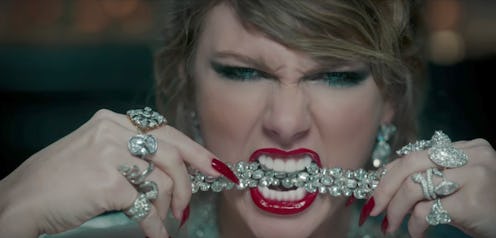Entertainment
You Def Missed This Shakespearean Kimye Clap Back In Taylor's "Look What You Made Me Do" Video
Taylor Swift is back with a vengeance and she's drawing on some classical inspiration to make that point very, very clear. In the teaser for her "Look What You Made Me Do" music video, Swift makes a Shakespearean reference about Kimye that is both severe and undeniable. The song, which could be considered a thinly-veiled critique of how Swift was treated during the very public fallout between herself and Kimye in the summer of 2016, employs a reference to Shakespeare's play Julius Caesar in the music video teaser. In referencing the play, whose most climactic scene involves the titular Caesar being betrayed and murdered by his closest friends, Swift has made a fairly damning statement of her own about her current feelings towards Kimye without saying a word.
At one point in the "Look What You Made Me Do" teaser, we are shown what looks like Swift sitting in a chair with her hand grasping a skull at the end of her chair's arm. The skull has no eyes; instead, "Et tu, Brute" is carved into it. This line, translated as "And you, Brutus" from Latin, refers to the climax of Julius Caesar when the titular Caesar is stabbed by his close friend, Brutus, in an attempt to push the ultra-powerful ruler off the mortal coil.
It would appear that Swift is likening herself to Caesar in making this reference. Regardless of the play's argument that Caesar actually becomes too power-hungry (which could undermine Swift comparing herself to Caesar), calling someone "Brutus" is still a fairly harsh accusation; it implies that someone (aka Kimye) is murderous. Even metaphorically speaking, Swift using "Brutus" against her former friends is, well, brutal.
It's as if she believes she has been backstabbed by people she may have thought were her friends and they have gravely harmed her. Even if you didn't follow their public falling out closely, you may be able to see why Swift feels this way: with Kimye possibly betrayed her confidence, choosing to publicize videos where Swift approved West referencing her in his song "Famous." But the image and the reference also impresses upon us that Swift seems to have recovered from this betrayal. For example, in the song, she talks of rising from the dead and feeling better than ever.
This Shakespearean reference is a fairly intense one for Swift to make, especially with it being so graphic in nature. It will be interesting to see how many more references to betrayal she makes in the music video itself and perhaps whether the idea of betrayal will become a primary theme on her album, Reputation. Swift seems to refuse to succumb to the same fate as Caesar and she's using her new voice to make her feelings about how she feels in a post-Kimye feud world known far and wide.
